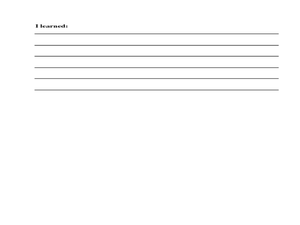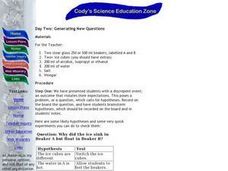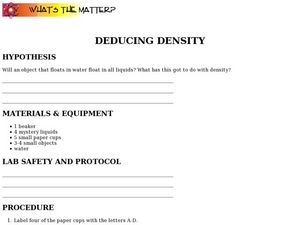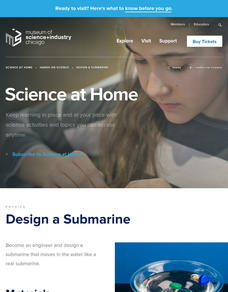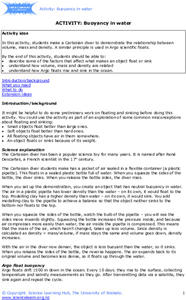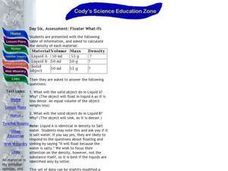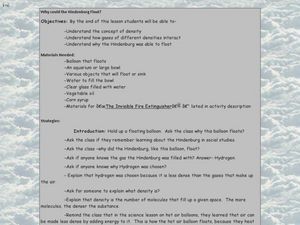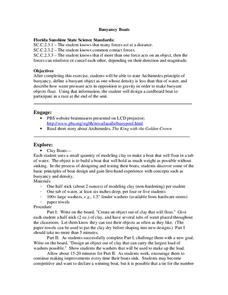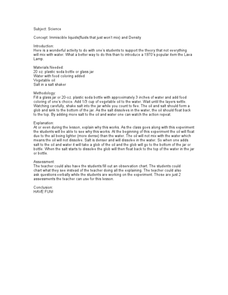Curated OER
I've Got That Sinking Feeling
Middle schoolers design a simple boat and predict how much weight it can carry. They should also discover why objects float or sink and how this can be determined experimentally. A great lesson on buoyancy!
Curated OER
Why Cheerios Don't Sink
Students investigate Archimedes' Principle and show how it relates to density. In this Archimedes' Principle lesson plan, students experiment with a beaker of water, a Styrofoam "boat" and a weight. They predict what will happen when the...
Curated OER
The Weight of Water
Students examine how salt water is more dense than fresh water. They discuss how manatees need to float and sink, conduct a sink or float experiment, and conduct an experiment with eggs and salt and fresh water.
Curated OER
Density and Mass
Students experiment to find which liquids are more dense. In this density and mass lesson plan, students predict and then test objects to observe and measure their density. students observe which items sink and float. Students...
Curated OER
Day Two: Generating New Questions
Students investigate buoyancy by participating in a lab experiment. In this density lesson, students utilize vinegar and alcohol in beakers and attempt to float different items in them. Students analyze which items float and do not while...
Curated OER
Deducing Density
In this deducing density learning exercise, students follow the procedures to set up an experiment about objects floating in water and liquids of different densities, answer questions, collect data and complete charts.
Museum of Science
Design a Submarine
Don't just sink the boat. Using a closed container as a submarine, pupils experiment to see what to add to the container to make it float, sink to the bottom, and hover in the middle. After finding one option, learners see if they can...
University of Waikato
Buoyancy in Water
Change where an object floats in water. Pupils experiment with a Cartesian diver by squeezing on the side of a plastic bottle. Learners pay attention to the bulb of the pipette as the bottle is squeezed to determine what is happening...
Mr. Hill's Science Website
Density Workbook
It's all about density! Here's a dense workbook for young scientists; they solve (and show work for) 29 density word problems, including a problem where they solve for the density of Godzilla. They complete labs analyzing metal...
Curated OER
Day Six: Floater What Ifs
Young scholars observe earth science by examining results from an experiment. In this buoyancy lesson, students practice floating different items in two different liquids and identify why certain objects will float and others sink. Young...
Curated OER
How Does the USS Alabama Float?
Students investigate buoyancy. In this buoyancy lesson, students apply the Archimedes Principle of Buoyancy to the experiment conducted in class to determine how battleships float.
Curated OER
Student Exploration: Density Experiment: Slice and Dice
In this density worksheet, students explore an internet program called Gizmo where they do an experiment with density. Students complete 18 questions.
Curated OER
Designing and Floating Boats
Middle schoolers participate in an experiment to determine if a toy boat will sink or float. They make the boats out of different materials and determine its carrying capacity by adding pennies. They graph their findings on a classroom...
Curated OER
Why Could the Hindenburg Float?
Tenth graders experiment with floating and sinking objects and heavy and light liquids, using correct terms, like density, to explain what happens. In this Hindenburg lesson, 10th graders watch a demonstration called the invisible...
Curated OER
Technology of the Deep: Experiments with Buoyant Forces
Students conduct a series of experiments to study the effects of temperature and salinity on the buoyancy of an object in water. They devise ways to make floating and sinking objects neutrally buoyant.
Reach Out!
Paper Clip Sailing
Students explore water, molecules, and surface tension. In this floatation instructional activity, students discover why some objects are able to float on water as they follow the procedures included in this activity.
Curated OER
Exploring the Properties of Matter in the Preschool
Students study the properties of the physical and natural world. In this properties of the physical and natural world lesson, preschool students work at discovery tables to see how simple machines work, what happens when items are put...
Curated OER
Water Exploration Station
Students explore the characteristics of water. In this water exploration lesson, students participate in various learning centers to inquire how water drains and how to increase the flow of water. Students use estimation and measurement...
Center for Precollegiate Education and Training
Buoyancy Boats
What did the sea say to the boat? Nothing, it just waved. An inquiry-based lesson starts with a simple concept on the Archimedes Principle and challenges pupils to make something out of clay that floats. Then, they design...
Curated OER
MEASURING THE DENSITY OF WATER
Students perform an experiment to measure the density of tap water vs. salt water.
Curated OER
Immiscible Liquids and Density
Learners will make a lava lamp. In this density lesson, students will combine water and oil and make observations, then add salt to the oil and observe the oil sink, then float again when the salt dissolves in the water.
Curated OER
Grand Designs And Great Failures
Students extend their understanding of floating, sinking, density, and buoyancy and apply it to the design and testing of ships. students discover that most ships are constructed very similarly-whether they are schooners or destroyers.
Curated OER
Ships 3: Grand Designs And Great Failures
Students engage in this, the third in a three-part series on ships. The overall lesson series is designed to allow students to extend their understanding of floating, sinking, density, and buoyancy and apply it to the design and testing...
Teach Engineering
Clay Boats
Clay itself sinks, but clay boats float. Why? Young engineers build clay boats to learn about buoyancy. They test the weight the boats can hold using washers and then tweak their designs to make improvements, following the engineering...



